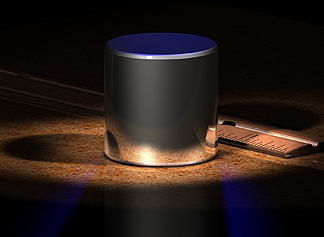 How much is a kilogram?
How much is a kilogram?
It turns out that nobody can say for sure, at least not in a way that won’t change ever so slightly over time. The official kilogram—a cylinder cast 118 years ago from platinum and iridium and known as the international prototype kilogram or “Le Gran K”—has been losing mass, about 50 micrograms at last check. The change is occurring despite careful storage at a facility near Paris.
That’s not so good for a standard the world depends on to define mass.Now, two U.S. professors—a physicist and mathematician—say it’s time to define the kilogram in a new and more elegant way that will be the same today, tomorrow and 118 years from now. They’ve launched a campaign aimed at redefining the kilogram as the mass of a very large—but precisely-specified—number of carbon-12 atoms.
“Our standard would eliminate the need for a physical artifact to define what a kilogram is,” says Ronald F. Fox, a Regents’ Professor Emeritus in the School of Physics at the Georgia Institute of Technology. “We want something that is logically very simple to understand.”
…
Add new comment